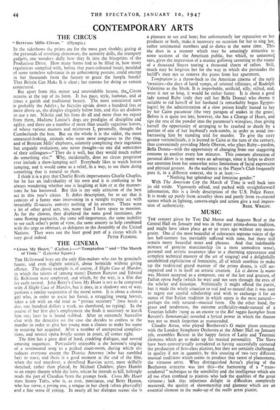THE CINEMA
Cross My Heart." (Cariton.)—" Temptation " and " The March of Time." (Leicester Square.)
THE Hollywood boys are the only film-makers who can be genuinely funny, and even slightly satirical, about homicide without giving offence. The classic example is, of course, A Slight Case of Murder, in which the talents of (among many) Damon Runyon and Edward G. Robinson were employed, and which, by the way, is a film due for early revival. John Berry's Cross My Heart is not to be compared with A Slight Case of Murder, but it does, in a shadowy sort of way, perform a similar suspension of the moral sense. It is about a chorus girl who, in order to assist her fiancé, a struggling young lawyer, takes a job with an old roue as " private secretary " (two hours a day, one hundred dollars a week, no shorthand, no typing). In the course of her first day's employment she finds it necessary to knock him out; later he is found stabbed. After an extremely Surrealist chat with the detective on the case she decides to confess to the murder in order to give her young man a chance to make his name in securing her acquittal. After a nuritber of unexpected complica- tions, and several opera bouffe scenes in court, all comes right.
The film has a great deal of hard, crackling dialogue, and several amusing sequences. Particularly enjoyable is the heroine's singing of a sentimental song to a packed court-room, during which she reduces everyone except the District Attorney (who has rumbled her) to tears; and there is a good moment at the end of the film, when the real murderer, a demented Russian actor, most skilfully sketched, rather than played, by Michael Chekhov, plays Hamlet to an empty theatre while the hero, whom he intends to kill, haltingly reads the part of Claudius from the prompt book. Cross My Heart stars Sonny Tufts, who is, as ever, innoc=uous, and Betty Hutton, who has verve, a roving eye, a tongue in her cheek (often physically) and a fine sense of timing. In nearly all her dialogue scenes she is
a pleasure to see and hear; but unfortunately her reputation or her producer or both, make it necessary on occasion for her to sing hot, rather sentimental numbers and to dance at the same time. This she does in a manner which may be amazingly attractive to some sections of the American public, but which, to untutored ears, gives the impression of a maniac golliwog cavorting to the sound of a thousand Smees tearing a thousand sheets of calico. Still, 'much may be forgiven her for the way in which she persuades the bailiff's men not to remove the piano from her apartment.
Temptation is a throw-back to the American cinema of the early 'twenties—the days of lurid vamps, of oriental villainies, of Rudolph Valentino as the -Sheik. It is improbable, artificial, silly, stilted, and, were it not so long, it would be rather funny. It is about a good lady named Ruby (only they call her Bella Donna) who deems it suitable to rid herself of her husband (a remarkably bogus Egypto- logist). by the administration of a slow poison kindly loaned to her by her Cairo paramour (the very paragon of snakes in the grass). Before it is quite too late, however, she has a Change of Heart, and tips the rest of the powder into the paramour's wineglass, thus giving herself the opportunity of arranging to be crushed to death by a portion of one of her husband's rock-tombs, in order to avoid em- barrassing him by standing trial for murder. To give the story greater verisimilitude, it is located in Cairo at the turn of the century, thus conveniently providing Merle Oberon, who plays Ruby—pardon, Bella Donna—with the opportunity of changing from one staggering costume to another every few minutes. This constant alteration of personal decor is in many ways an advantage, since it helps to divert our attention from her somewhat strict limitations of facial expression and physical gesture. As the audience at the Player's Club frequently puts it, in a different context, she is at least :—
" Nothing but splendour and feminine gender."
With The American Cop the March of Time is well back into its old stride. Vigorously edited, and packed with straightforward information, this is a lively description of the U.S. Police Force. It is made up partly from actuality shots and partly from re-enacted scenes which in lighting, camera-angle and action give a real impres-


































 Previous page
Previous page